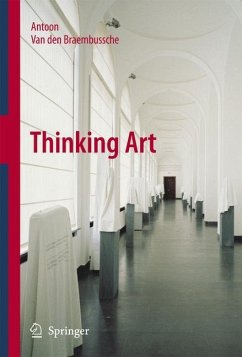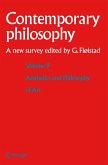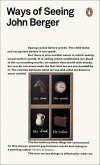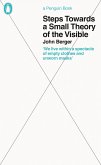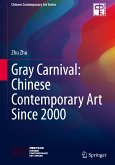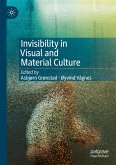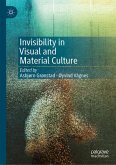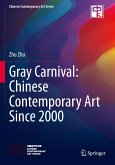In the twentieth century, avant-garde movements have pushed the concept of art far beyond its traditional boundaries. In this dynamical process of constant renewal the prestige of thinking about art as a legitimizing practice has come to the fore. So it is hardly surprising that the past decades have been characterized by a revival or even breakthrough of philosophy of art as a discipline. However, the majority of books on aesthetics fail to combine a systematical philosophical discourse with a real exploration of art practice.
Thinking Art attempts to deal with this traditional shortcoming. It is indeed not only an easily accessible and systematic account of the classical, modern and postmodern theories of art, but also concludes each chapter with an artist's studio in which the practical relevance of the discussed theory is amply demonstrated by concrete examples. Moreover, each chapter ends with a section on further reading, in which all relevant literature is discussed in detail.
Thinking Art provides its readers with a theoretical framework that can be used to think about art from a variety of perspectives. More particularly it shows how a fruitful cross-fertilization between theory and practice can be created. This book can be used as a handbook within departments of philosophy, history of art, media and cultural studies, cultural history and, of course, within art academies. Though the book explores theories of art from Plato to Derrida it does not presuppose any acquaintance with philosophy from its readers. It can thus be read also by artists, art critics, museum directors and anyone interested in the meaning of art.
Thinking Art attempts to deal with this traditional shortcoming. It is indeed not only an easily accessible and systematic account of the classical, modern and postmodern theories of art, but also concludes each chapter with an artist's studio in which the practical relevance of the discussed theory is amply demonstrated by concrete examples. Moreover, each chapter ends with a section on further reading, in which all relevant literature is discussed in detail.
Thinking Art provides its readers with a theoretical framework that can be used to think about art from a variety of perspectives. More particularly it shows how a fruitful cross-fertilization between theory and practice can be created. This book can be used as a handbook within departments of philosophy, history of art, media and cultural studies, cultural history and, of course, within art academies. Though the book explores theories of art from Plato to Derrida it does not presuppose any acquaintance with philosophy from its readers. It can thus be read also by artists, art critics, museum directors and anyone interested in the meaning of art.
"Antoon van den Braembussche has written a well-founded and deserving book, which is also of startling complexity and literary quality." -- Prof. Michael Lingner, University of the Visual Arts, Hamburg, Germany
"I am very impressed by the book. In a relatively limited space of 300 pages it unfolds a broad spectrum of philosophy of art, including methodological issues. The included suggestions for further reading will certainly stimulate students towards further independent research in the field." -- Prof. Brigitte Scheer, Johann Wolfgang Goethe University, Frankfurt am Main, Germany.
"Van den Braembussche not only introduces the most important theories of modern art philosophy clearly and systematically, he continuously compares the diverse theoretical viewpoints with each another. The book presents an easily accessible picture of the current debate in art philosophy. The book is also charming because the author closes each chapter with "The Artist's Studio", where the philosophical issues discussed are considered from the perspective of an artist." -- Henk Slager, Editor of Lier & Boog (Published)
"Thinking Art was written as a teacher's manual for philosophy of art. But thanks to the systematic treatment and the understandable language, casual and lacking dry theory, the book is accessible to everyone." -- Philosophy Magazine (Published)
"Van den Braembussche provides a convincing demonstration of the productive relationship between art philosophy, the artist and art itself." -- Krisis (Published
"I am very impressed by the book. In a relatively limited space of 300 pages it unfolds a broad spectrum of philosophy of art, including methodological issues. The included suggestions for further reading will certainly stimulate students towards further independent research in the field." -- Prof. Brigitte Scheer, Johann Wolfgang Goethe University, Frankfurt am Main, Germany.
"Van den Braembussche not only introduces the most important theories of modern art philosophy clearly and systematically, he continuously compares the diverse theoretical viewpoints with each another. The book presents an easily accessible picture of the current debate in art philosophy. The book is also charming because the author closes each chapter with "The Artist's Studio", where the philosophical issues discussed are considered from the perspective of an artist." -- Henk Slager, Editor of Lier & Boog (Published)
"Thinking Art was written as a teacher's manual for philosophy of art. But thanks to the systematic treatment and the understandable language, casual and lacking dry theory, the book is accessible to everyone." -- Philosophy Magazine (Published)
"Van den Braembussche provides a convincing demonstration of the productive relationship between art philosophy, the artist and art itself." -- Krisis (Published
Antoon van den Braembussche has written a well-founded and deserving book, which is also of startling complexity and literary quality.
- Prof. Michael Lingner, University of the Visual Arts, Hamburg, Germany
I am very impressed by the book. In a relatively limited space of 300 pages it unfolds a broad spectrum of philosophy of art, including methodological issues. The included suggestions for further reading will certainly stimulate students towards further independent research in the field.
- Prof. Brigitte Scheer, Johann Wolfgang Goethe University, Frankfurt am Main, Germany.
Van den Braembussche not only introduces the most important theories of modern art philosophy clearly and systematically, he continuously compares the diverse theoretical viewpoints with each another. The book presents an easily accessible picture of the current debate in art philosophy. The book is also charming because the author closes each chapter with "The Artist's Studio", where the philosophical issues discussed are considered from the perspective of an artist.
- Henk Slager, Editor of Lier & Boog (Published)
Thinking Art was written as a teacher's manual for philosophy of art. But thanks to the systematic treatment and the understandable language, casual and lacking dry theory, the book is accessible to everyone.
- Philosophy Magazine (Published)
Van den Braembussche provides a convincing demonstration of the productive relationship between art philosophy, the artist and art itself.
- Krisis (Published)
- Prof. Michael Lingner, University of the Visual Arts, Hamburg, Germany
I am very impressed by the book. In a relatively limited space of 300 pages it unfolds a broad spectrum of philosophy of art, including methodological issues. The included suggestions for further reading will certainly stimulate students towards further independent research in the field.
- Prof. Brigitte Scheer, Johann Wolfgang Goethe University, Frankfurt am Main, Germany.
Van den Braembussche not only introduces the most important theories of modern art philosophy clearly and systematically, he continuously compares the diverse theoretical viewpoints with each another. The book presents an easily accessible picture of the current debate in art philosophy. The book is also charming because the author closes each chapter with "The Artist's Studio", where the philosophical issues discussed are considered from the perspective of an artist.
- Henk Slager, Editor of Lier & Boog (Published)
Thinking Art was written as a teacher's manual for philosophy of art. But thanks to the systematic treatment and the understandable language, casual and lacking dry theory, the book is accessible to everyone.
- Philosophy Magazine (Published)
Van den Braembussche provides a convincing demonstration of the productive relationship between art philosophy, the artist and art itself.
- Krisis (Published)

